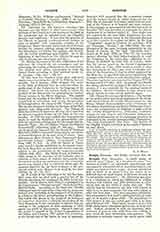

Scruple (Lat. Scrupulus, “a small sharp, or pointed, stone”, hence, in a transferred sense, “uneasiness of mind”), an unfounded apprehension and consequently unwarranted fear that something is a sin which, as a matter of fact, is not. It is not considered here so much as an isolated act, but rather as an habitual state of mind known to directors of souls as “a scrupulous conscience”. St. Alphonsus describes it as a condition in which one influenced by trifling reasons, and without any solid foundation, is often afraid that sin lies where it really does not. This anxiety may be entertained not only with regard to what is to be done presently, but also with regard to what has been done. The idea sometimes obtaining, that scrupulosity is in itself a spiritual benefit of some sort, is, of course, a great error. The providence of God permits it and can gather good from it as from other forms of evil. That apart, however, it is a bad habit doing harm, sometimes grievously, to body and soul. Indeed, persisted in with the obstinacy characteristic of persons who suffer from this malady, it may entail the most lamentable consequences. The judgment is seriously warped, the moral power tired out in futile combat, and then not unfrequently the scrupulous person makes shipwreck of salvation either on the Scylla of despair or the Charybdis of unheeding indulgence in vice.
It is of great importance to be able to make a correct diagnosis of this disease. Hence especially guides of consciences should be familiar with the symptoms that betray its presence as well as with the causes which commonly give rise to it. For one thing, the confessor should not confound a delicate with a scrupulous conscience; neither should he interpret the reasonable solicitude sometimes discernible in those who are trying to emerge from a life of sin as a sign of scrupulosity. Then, too, ordinarily he ought not to hastily reach this conclusion on the very first experience of his penitent. It is true there are cases of scruples which may be recognized from the start, but this is not the rule. Some special indications that persons are really scrupulous, generally adopted by theologians, are those enumerated by Lacroix. Among these is a certain rooted attachment to their own opinion which makes them unwilling to abide by the judgment of those whom they consult, even though these latter have every title to deference. In consequence, they go from one confessor to another, change their convictions with hardly a shadow of motive, and are tortured by an overshadowing dread that sin lurks in everything they do, and say, and think. The scrupulous may, and ought to, act in defiance of their misgivings, i.e. against their so-called conscience. Nor can they; therefore, be impeached as acting in a state of practical doubt. The unreal phantasm that affrights their imagination, or the unsubstantial consideration that offers itself to their disturbed reason, has no validity against the conscience once formed upon the pronouncement of the confessor or in some other equally trustworthy fashion. In the various perplexities as to the lawfulness of their actions they are not bound to employ any such scrutiny as would be incumbent upon persons in a normal condition. They are not bound to repeat anything of former confessions unless they are sure, without protracted examination, that it is a mortal sin and has never been properly confessed.
Their chief remedy is, having reposed confidence in some confessor, to obey his decisions and commands entirely and absolutely. They are counselled also to avoid idleness, and thus to close the avenue of approach to the wild conjectures and strange ponderings responsible for so many of their worries. They should remove the cause of their scruples in so far as it may have been of their own choosing. Hence they are to guard against the reading of ascetical books of a rigorist trend and any intercourse with those afflicted in the same way as themselves. If the source of their scruples be ignorance—for example, with regard to the obligation of some commandment—they are to be instructed, discretion being used in the imparting of the necessary information. If it be a propensity to melancholy, certain harmless pleasures and rational enjoyments may be employed with advantage. Confessors to whom falls the difficult task of receiving the confessions of these harassed souls are to carefully inquire into the origin of the anxieties laid before them. They are to treat their unhappy penitents in general with great kindness. Occasionally, however, some degree of severity may be useful when the penitent shows an extreme tenacity in adhering to his own unreasonable view of the situation. As a rule, the confessor’s answers to the innumerable troubles submitted should be clear, unaccompanied by reasons, and so unhesitating as to inspire courage. He should not permit the presentation indefinitely of the various doubts, much less, of course, the repetition of past confessions. Finally, he may sometimes do what should hardly ever be done in any other instance that is, forbid the penitent to have recourse to another confessor.
JOSEPH F. DELANY

